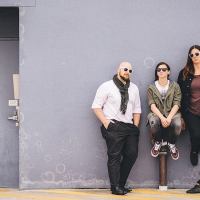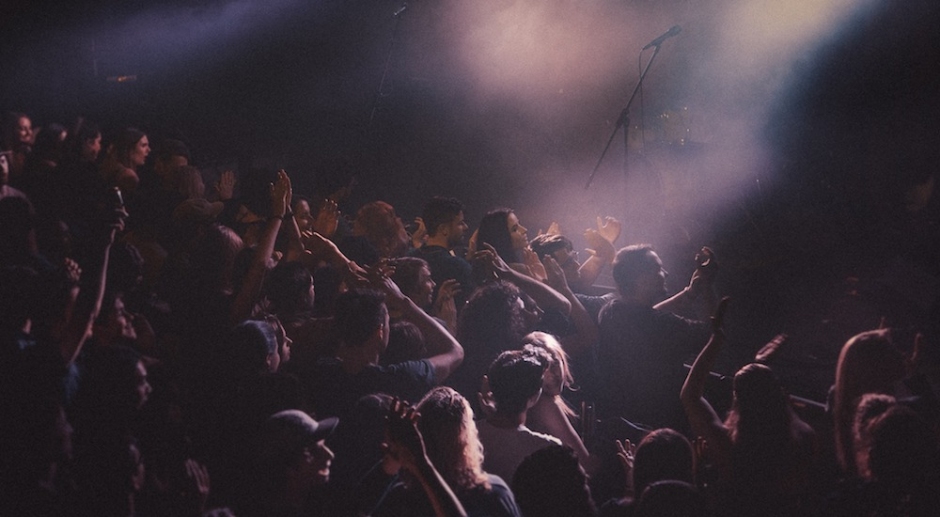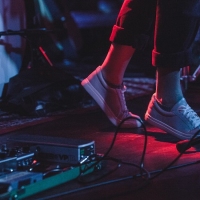 A Song About Getting A Vagina, And All The Shit That Comes With ItLionizer's Bailey Lions talks us through a track from their debut LP, written post-Sexual Reassignment Surgery.
A Song About Getting A Vagina, And All The Shit That Comes With ItLionizer's Bailey Lions talks us through a track from their debut LP, written post-Sexual Reassignment Surgery.

We asked a Uni professor for advice on making music venues/events safer spaces
UNSW's Dr Bianca Fileborn will be speaking at this month's Electronic Music Conference.
Electronic Music Conference 2017 visits Sydney's Redfern for a two-day program seeing international music leaders and industry experts appear across an array of panels, talks, workshops, parties and masterclasses on November 29-30. Tickets are on sale now via electronicmusicconference.com, with tickets to the Safe Spaces Panel available HERE.
At the Marion Bay leg of the 2016/2017 Falls Festival, five incidences of sexual assault – including one rape – were reported to Tasmanian police. At the Rainbow Serpent Festival held in regional Victoria back in January, two reports of sexual assault were filed. Combine these heavily reported cases with those left unreported, and the issue of sexual assaults at Australian clubs and music festivals appears to grow worse and worse every year. "The vast majority of incidents – particularly of sexual, homophobic and transphobic violence – are not reported to the police," says Bianca Fileborn, a professor at The University of New South Wales (UNSW) who specialises in sexual violence and harassment, when asked if the number of sexual assaults at Australian venues has increased. "Some of the behaviours of concern are not necessarily covered under current criminal laws. As a result, we simply do not know if there has been an increase in abuse and assault in Australian venues."
Australian venues are a hotspot for sexual assault and unwanted behaviour – just ask any woman. A 2012 survey of concert-goers found that 96.6% of show attendees thought that unwelcome sexual conduct occurs in Australian event spaces, and 80.2% of those surveyed viewed unwanted sexual behaviour in Australian clubs and festivals as "common". Additionally, the recent #MeToo movement has spurred a large number of women to speak out about their experiences with sexual harassment at shows. It affects everyone, from the women performing on our venue stages, to those working behind the scenes or behind the bar, to those just attending the events and looking for a fun night out with their friends. It's a problem that has a plagued our venues for far too long, and it has gotten to the point that it's absolutely disgusting that it seems to continue in 2017.
That said, in a bid to combat the unacceptable behaviour, some great initiatives have popped up in the past 12 months to make our venues safer from sexual predators. For its 2017 event, Laneway Festival partnered with Australian indie-rock trio Camp Cope for 1800-Laneway, a hotline used to report unacceptable behaviour – sexual or otherwise – at its most recent event. "We just got, like, so fed up," told the trio's Georgia Maq to SBS earlier this year. "All these bad things happen at peoples shows and they know about it, and they don't say anything. We're very loud about it. We look at people and if we see it happening we call it out."
Likewise, 2017 saw the launch of Your Choice; a music industry supported campaign which aims to address the harmful behaviour plaguing our venues. Some of Australian music's biggest names – Alex Lahey, Amy Shark, Montaigne and The Avalanches included – have all thrown their backing towards the initiative, as have a massive list of Australian festivals, venues and industry folk (including ourselves). "Your Choice is about being culturally proactive, we don't want to stick our heads in the sand around any of these issues and pretend they're not happening," said the campaign when it launched earlier this year. "As industry representatives, we will continue to work with the public, emergency services, community groups and government agencies to develop informed and preventative strategies rather than legislative, restrictive solutions."
The general goal for initiatives such as Your Choice is to transform our venues and music industry as a whole into safe spaces where people of all backgrounds can enjoy music without the added stress of possible harassment. Ahead of a panel regarding safe spaces at this year's Electronic Music Conference, we chatted to Fileborn to gain a slightly different perspective on safe spaces and sexual assault in our music scene than usual. It's an incredibly important topic which needs to be dealt with instantly – let's not let it get to the point where we must literally cancel festivals because of our shitty behaviour at our music events.
So what constitutes a safe space, and what kind of behaviour are safe spaces trying to avoid?
There is not necessarily one type of space that will be encountered as ‘safe' by all people. Different people will likely have different ideas of what constitutes ‘safety', and of what needs to happen for them to feel safe. For this reason, the term safer spaces is often preferred, as this better acknowledges some of the limitations of implying we can achieve absolute safety at all times.
The types of behaviour of concern will likely vary across different festival or venue spaces, depending on their target demographic and the types of issues that relate to them. However, generally speaking, groups advocating for safer spaces are trying to avoid behaviours that make other patrons feel unsafe, uncomfortable, unwelcome, or that impinge on their bodily autonomy in some way. This can include things like sexual harassment and sexual assault, transphobic and homophobic abuse and violence, physical assault, ableist-abuse and so forth.
A safer space is one that takes reasonable steps to prevent the occurrence of these types of behaviours, and that takes them seriously if and when they do occur.
How much responsibility should venues take for incidences of sexual harassment and assault?
Venues do have a responsibility to take steps to prevent sexual harassment and assault, and to respond appropriately if and when incidents occur. Obviously, venues do not have absolute control over how their patrons behave, and the issue of harassment and assault is not unique to venues. Sexual assault and harassment are broader social and cultural issues, and a range of factors outside of venue control and responsibility will influence patrons' attitudes and behaviours.
However, venues have a clear responsibility and role to play in taking action over the things they do have control over. This includes working to foster a culture that does not support sexual harassment and assault. For example, venues can work to ensure they are gender-inclusive, and that they don't promote a sexual culture based on the objectification and exploitation of women and gender-diverse people. Likewise, management can run campaigns and introduce policy around sexual harassment and assault. These should clearly express to patrons that harassment and assault are not tolerated in the venue, and that there are consequences for engaging in this behaviour. Finally, venues should ensure that their staff are trained to respond appropriately if harassment or assault do occur. All staff should be aware of venue policy, should believe and support victims if they report something, and should take actions to remove the perpetrator from the venue or contact police where appropriate.
If a situation arises where someone feels uncomfortable about another person's behaviour or attitude, what should they do? What about if you're witnessing it happen to another?
Ideally, they should feel able to tell venue staff about that person's behaviour. However, unfortunately at the moment most venue staff have not received training on how to respond to these types of incidents, and may not respond well. As such, if someone is made to feel uncomfortable, they should do whatever they feel safe to do at that moment.
Confronting a perpetrator/potential perpetrator is generally not advisable, as it can escalate the situation or result in harm to the bystander. The exception here is if you are friends with the perpetrator. If you see your friend doing something inappropriate or making someone else uncomfortable, call them out! Bystanders can try to check in with the person who is receiving the unwanted sexual attention – is there a chance to ask them if they're ok? Can you create a diversion so they have an opportunity to get away from the perpetrator? Can you find the victim's friends and ask them to help?
What kind of programs or policies can venues implement to ensure they are safe spaces?
There is currently a pilot program being developed by the Victorian government to help train venue staff to identify sexual harassment and assault, and to help staff develop skills to intervene and respond effectively. Hopefully, this pilot will be met with success and introduced more widely. In the meantime, venues could consider working with their local sexual assault service to provide staff with basic training on sexual violence.
What are the main characteristics safe spaces programs need?
Ensuring that all staff within a venue are trained in understanding what constitutes different types of harassment, violence and assault; ensuring that all staff are aware of how to respond appropriately to incidents that are reported to them; ensuring that all staff are trained in how to identify potential incidents or warning signs that someone's behaviour may escalate. Ideally, venues should also assess their own culture, and whether the venue culture might support certain forms of harassment, violence or abuse (e.g., do you have sexually objectifying images displayed in the venue? For music venues, is there a strong gender imbalance in the bands/acts that you book?).
Is it more effective to target perpetrators of sexual harassment through these programs, or the venue/event managers/general public for prevention?
Ideally, we need to target all of these groups. We know that prevention programs are most effective when they take a ‘whole of community' approach. This means that, firstly, everyone within a particular community is given a clear role to play in working towards the prevention of sexual violence – whether this is changing the behaviour of perpetrators, potential bystanders, or community members who might support or condone perpetrator's actions. Secondly, it means that we promote a consistent message in terms of our values and expectations regarding sexual violence across all aspects of society – so, regardless of the setting or venue that we're in, sexual harassment and assault are not tolerated.
Follow EMC: FACEBOOK
 A Song About Getting A Vagina, And All The Shit That Comes With ItLionizer's Bailey Lions talks us through a track from their debut LP, written post-Sexual Reassignment Surgery.
A Song About Getting A Vagina, And All The Shit That Comes With ItLionizer's Bailey Lions talks us through a track from their debut LP, written post-Sexual Reassignment Surgery.
 We talk gender bias with APRA AMCOS & Picnic Events ahead of EMCJana Gibson and Carly Roberts talk gender ahead of Electronic Music Conference this month.
We talk gender bias with APRA AMCOS & Picnic Events ahead of EMCJana Gibson and Carly Roberts talk gender ahead of Electronic Music Conference this month.